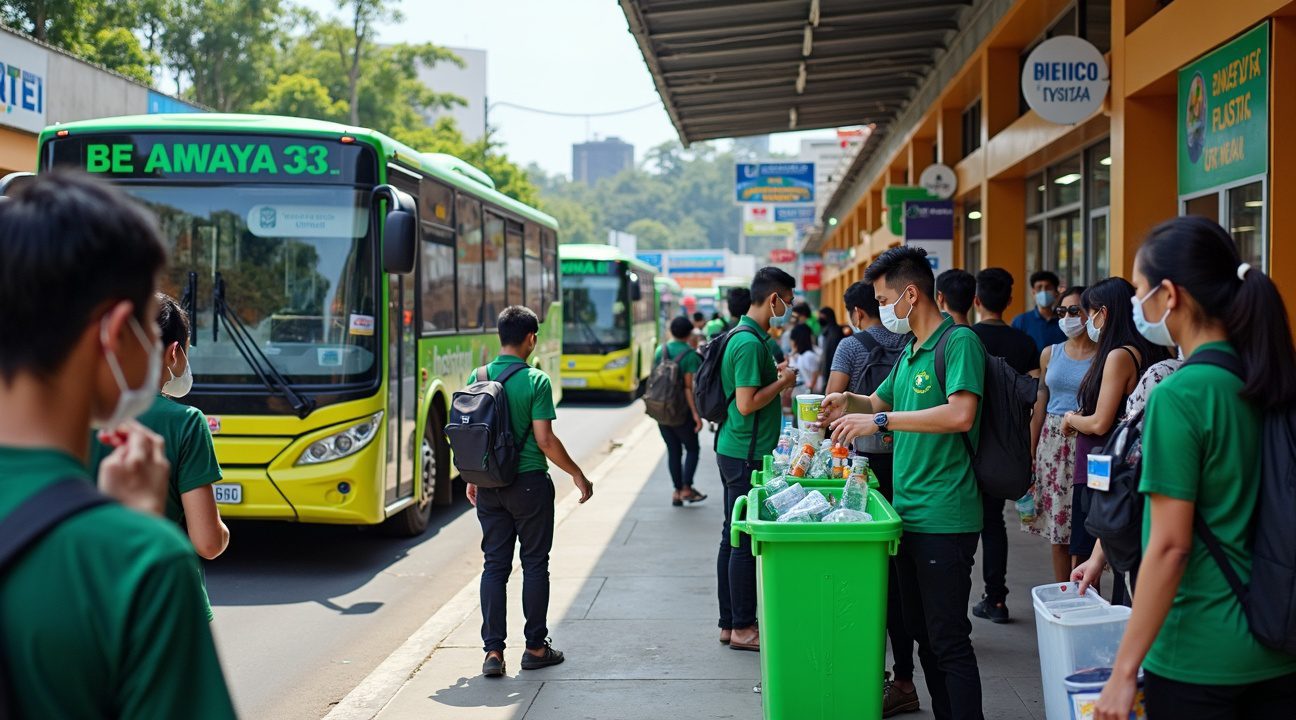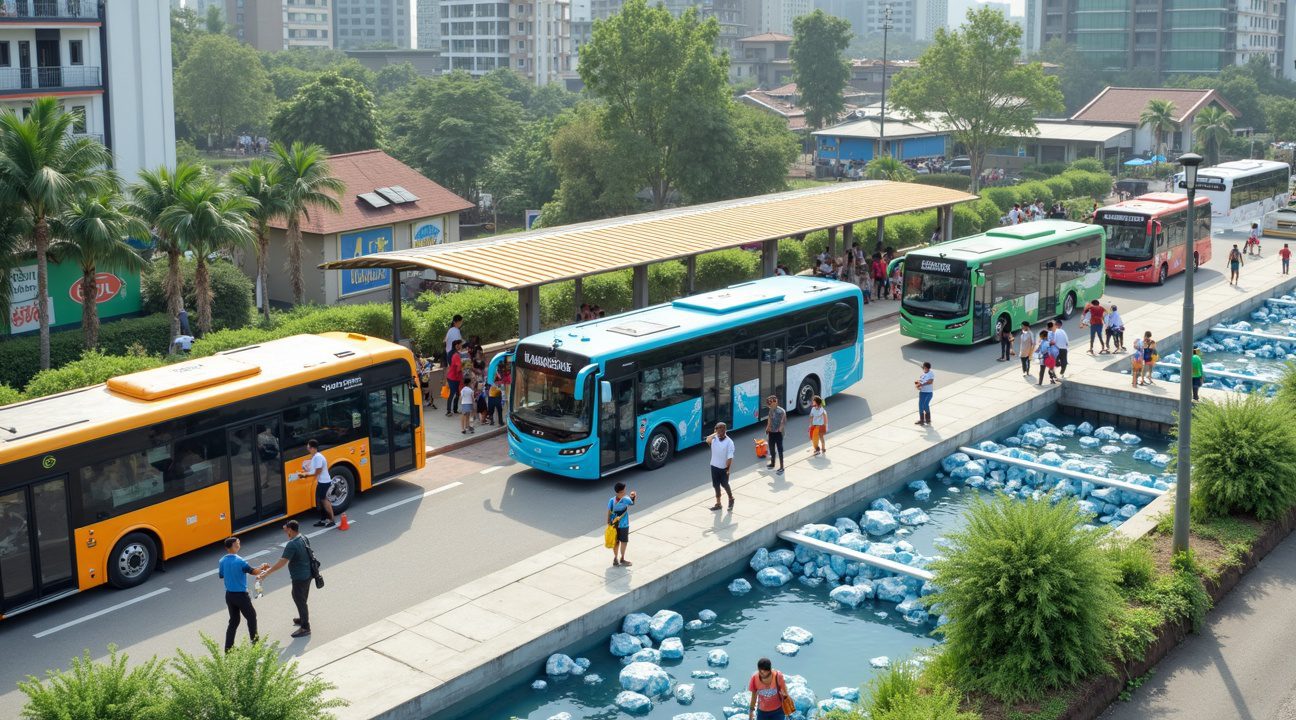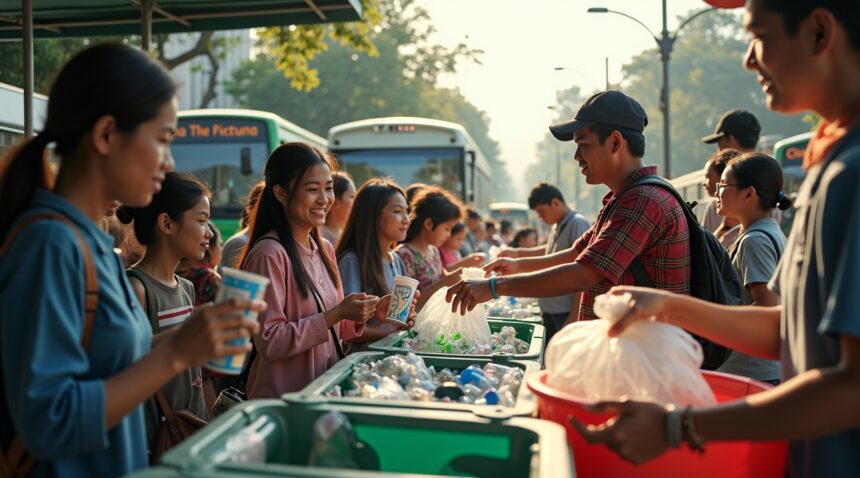Surabaya, Indonesia has transformed urban transportation by enabling residents to pay bus fare with plastic waste instead of cash, establishing an innovative system where 10 plastic cups or 5 plastic bottles equals one two-hour bus ticket.
Key Takeaways
- Passengers can board city buses by exchanging 10 plastic cups or 5 plastic bottles for a two-hour ticket, making transportation accessible regardless of economic status.
- The program collects approximately 250 kilograms of plastic waste per bus daily, which is sold through auctions to recycling facilities to fund transportation improvements.
- Surabaya aimed to become plastic waste-free by 2020, using this initiative as part of a comprehensive strategy to tackle Indonesia’s position as the world’s second-largest plastic pollution contributor.
- The circular economy model offers key advantages: free transportation for residents, reduced environmental pollution, steady income for the transit system, and reliable materials for recycling companies.
- International observers have hailed the program as a replicable model that supports UN Sustainable Development Goals and inspires similar innovations in cities worldwide.
Plastic Bottles and Cups Become Currency on Surabaya’s Buses
Surabaya’s revolutionary transportation system has transformed ordinary plastic waste into valuable currency for daily commuters. I’ve observed how this groundbreaking initiative allows residents to exchange their discarded plastic items for bus tickets, creating an innovative solution that addresses both urban mobility and environmental concerns simultaneously.
The exchange rate operates on a straightforward system that makes participation accessible to everyone. Passengers can board city buses by presenting either 10 plastic cups or 5 plastic bottles per ride. This plastic currency grants riders a two-hour bus ticket, providing ample time for most urban journeys across the city. The program accepts standard disposable cups and bottles that residents typically discard after use, giving these items immediate value in the public transportation ecosystem.
How the Payment Process Works
The collection process has been streamlined to ensure smooth operations during busy commuting hours. Passengers can submit their plastic waste through several convenient methods:
- Handing in items at designated collection points within bus terminals before boarding
- Presenting plastic waste directly to bus staff members once aboard the vehicle
- Exchanging items at mobile collection stations positioned near popular bus stops
- Utilizing special collection bins installed at major transit hubs throughout the city
Staff members receive training to quickly assess and count plastic items, maintaining efficient boarding times while ensuring proper waste collection. The collected materials undergo immediate sorting and preparation for recycling facilities, completing the circular economy loop that powers this unique transportation model.
This innovative approach fundamentally changes how residents view their daily commute and waste generation habits. Instead of discarding plastic items in regular trash bins, commuters now save these materials as potential transportation credits. The system encourages people to collect plastic waste from their households, workplaces, and communities, creating a city-wide network of environmental stewards who actively participate in waste reduction efforts.
The two-hour ticket duration provides flexibility for various journey types, from short trips across neighborhoods to longer cross-city travel. This timeframe accommodates transfers between different bus routes, shopping excursions, and business meetings without requiring additional payments. The program has proven particularly popular among students and working families who generate consistent amounts of plastic waste through daily activities.
Bus operators report high satisfaction rates among passengers who appreciate the dual benefit of affordable transportation and environmental contribution. The initiative has also sparked conversations about sustainable living practices, with many riders extending their environmental consciousness beyond the bus system into other aspects of their daily lives.
Local businesses have begun partnering with the program by encouraging customers to save plastic containers and cups specifically for bus fare. Restaurants and cafes now promote the initiative, creating community awareness about environmental responsibility while supporting public transportation usage.
The plastic-for-tickets system has generated significant interest from urban planners and environmental advocates worldwide. The program demonstrates how cities can integrate environmental solutions into essential public services, creating positive behavioral changes through practical incentives rather than punitive measures.
Collection data shows that buses accumulate substantial amounts of recyclable materials daily, with the plastic waste being processed through established recycling networks. This steady stream of clean, sorted materials provides recycling facilities with reliable input sources while reducing the overall plastic burden on Surabaya’s waste management infrastructure.
The success of this payment method has inspired discussions about expanding similar programs to other public services, including parking fees, library services, and municipal facility access. Early pilot programs are exploring how plastic waste currency might work for additional city services, potentially creating a comprehensive alternative economy based on environmental stewardship.
Residents have adapted quickly to this new payment system, with many households now organizing their plastic waste specifically for transportation use. The program has effectively turned what was once considered trash into a valuable resource that provides essential mobility services while contributing to environmental protection goals.

Indonesia’s Massive Plastic Problem Drives Innovation
Indonesia faces a critical environmental challenge that has sparked creative solutions across the country. As the world’s second-largest contributor to plastic pollution, the nation generates staggering amounts of plastic waste that end up contaminating both land and sea. Research shows that approximately 15% of plastics found in the world’s oceans originate from Indonesia, making it a significant global environmental concern.
Surabaya’s Strategic Response to Plastic Crisis
The city of Surabaya has emerged as a testing ground for innovative waste management approaches. In 2018, plastics comprised about 15% of Surabaya’s total waste stream, presenting both immediate disposal challenges and long-term environmental risks. City officials recognized that traditional waste collection methods weren’t sufficient to tackle this growing problem.
Driven by environmental urgency, Surabaya established an ambitious target to become plastic waste free by the end of 2020. This goal required comprehensive policy changes and community engagement strategies that went far beyond conventional recycling programs. The city’s leadership understood that achieving plastic-free status would demand creative thinking about incentivizing citizen participation.
The bus-for-plastic initiative directly addresses multiple environmental concerns simultaneously. Citizens receive immediate transportation benefits while contributing to waste reduction efforts, creating a win-win scenario that encourages consistent participation. This approach transforms plastic waste from an environmental burden into a valuable community resource.
Local waste management challenges often mirror global marine pollution issues, and Surabaya’s program recognizes this connection. Community-driven environmental initiatives like this demonstrate how individual actions can scale up to create meaningful environmental impact. The program’s design acknowledges that plastic pollution doesn’t respect city boundaries – waste that starts in urban areas often flows through waterways into international waters.
Indonesia’s broader recycling statistics reveal why targeted programs like Surabaya’s are essential for national environmental goals. The country’s rapid economic growth has increased consumption patterns, leading to higher plastic waste generation rates across urban centers. Innovative transportation solutions combined with environmental policy create powerful tools for addressing these systemic challenges.
The success of Surabaya’s plastic-for-transit program depends on consistent community participation and effective waste processing systems. Citizens must view plastic collection as a valuable activity rather than an inconvenience, which requires ongoing education and reliable service delivery. Environmental policy effectiveness often hinges on programs that provide immediate, tangible benefits to participants while achieving broader sustainability objectives.

How 250 Kilograms of Daily Plastic Collection Creates a Circular Economy
The numbers behind Surabaya’s plastic-for-transport program reveal an impressive scale of environmental impact. Each bus collects approximately 250 kilograms of plastic waste daily, transforming what was once street litter into a valuable resource. This substantial volume demonstrates how innovative thinking can address multiple urban challenges simultaneously.
From Collection to Revenue Generation
The collected plastic doesn’t simply disappear into storage facilities. Instead, Surabaya has established a systematic approach that maximizes the value of every bottle and wrapper collected. The process involves several key steps:
- All plastic waste undergoes sorting and preparation at designated facilities
- Clean, sorted materials are bundled for auction to certified recycling plants
- Recycling companies bid competitively for the collected materials
- Auction proceeds flow directly back into the city’s public transportation budget
- Funds support bus maintenance, route expansion, and service improvements
This structured approach ensures that every piece of plastic waste becomes a contributor to the city’s transportation infrastructure. Recycling plants benefit from a steady supply of raw materials, while the transportation system receives consistent funding that doesn’t rely on traditional tax revenue or fare increases.
The circular economy model works because it creates value at every stage. Passengers receive free transportation, the city reduces plastic pollution, recycling facilities obtain necessary materials, and the transportation system gains financial sustainability. Unlike traditional linear models where waste represents a cost, this system transforms waste into profit.
What makes Surabaya’s approach particularly effective is its closed-loop design. Revenue from plastic sales doesn’t disappear into general city funds but returns directly to transportation services. This creates a self-reinforcing cycle where better bus services encourage more ridership, which generates more plastic collection, leading to increased revenue for further improvements.
The 250-kilogram daily collection per bus represents more than just waste removal. Each kilogram collected prevents potential environmental damage while contributing to the system’s financial health. When multiplied across Surabaya’s entire fleet, the volume becomes significant enough to attract serious interest from recycling companies willing to pay competitive rates.
Transportation funding through this method offers advantages over conventional approaches. Traditional funding sources like taxes or fares can face political resistance or economic pressures. However, the plastic-to-revenue system remains relatively stable because it’s based on waste that already exists in the environment. The program essentially monetizes an existing problem rather than creating new financial burdens.
The auction system ensures competitive pricing for collected materials. Rather than accepting whatever recycling companies might offer, the competitive bidding process maximizes returns. This approach treats plastic waste as a commodity with real market value, not just something to dispose of cheaply.
Maintenance and improvement of bus services become possible through this steady revenue stream. Funds support everything from vehicle repairs to route optimization studies. The enhanced services attract more passengers, creating a positive feedback loop that strengthens the entire system.
The urban circular economy demonstrated here offers a template for other cities facing similar challenges. By connecting waste management with transportation needs, Surabaya has created a model where environmental benefits align with economic incentives. This integration of systems shows how creative policy design can solve multiple problems simultaneously.
Success depends on maintaining quality standards for collected plastic and ensuring reliable partnerships with recycling facilities. The system’s sustainability requires ongoing commitment from all participants, but the financial incentives help ensure continued participation. When environmental responsibility becomes profitable rather than costly, long-term success becomes much more likely.
Positive Community Response Sparks International Interest
The plastic-for-transport initiative has generated overwhelming enthusiasm from Surabaya residents, who’ve embraced this innovative approach to daily commuting. I’ve observed how quickly the community adopted this system, with locals actively collecting plastic waste throughout their neighborhoods to ensure they have enough materials for their bus rides. The program has transformed the relationship between citizens and their urban environment, making waste collection a purposeful activity rather than a chore.
International observers have taken notice of Surabaya’s groundbreaking approach, recognizing it as a model for other cities struggling with similar waste management challenges. The initiative has been profiled extensively as an innovative solution that simultaneously tackles urban waste reduction, improves recycling behavior, and enhances public transportation infrastructure. This multifaceted approach demonstrates how creative policy design can address several pressing urban issues with a single, elegant solution.
Setting New Standards for Sustainable Urban Policy
Surabaya’s unique plastic-for-transport payment system distinguishes itself from conventional recycling programs implemented in other cities worldwide. While many municipalities rely on traditional monetary incentives or penalties to encourage recycling, this Indonesian city has created a direct exchange system that makes plastic waste immediately valuable to residents. The innovation showcases how local governments can think beyond standard policy frameworks to create solutions that resonate with their communities’ specific needs and circumstances.
Practical Benefits Drive Continued Success
The program’s success stems from its practical benefits that extend beyond environmental impact. Local residents appreciate the cost savings on transportation, which can be significant for families with limited budgets. Bus ridership has increased as more people participate in the program, creating a positive cycle that strengthens both the recycling initiative and public transit usage. The system has also fostered a sense of community pride, as residents see their daily actions contributing directly to cleaner streets and improved city services.
Community feedback consistently highlights how the program has changed daily routines in positive ways. Children have become more aware of plastic waste, often helping their families collect materials for bus fare. This educational aspect has created lasting behavioral changes that extend beyond the immediate goal of waste reduction. The initiative has also sparked conversations about environmental responsibility, with participants sharing tips and strategies for maximizing their plastic collection efforts.
Infrastructure improvements have become another unexpected benefit of the program’s popularity. Increased bus ridership has justified investments in better vehicles and expanded routes, creating a more reliable public transportation network. The success has encouraged city officials to explore similar innovative approaches to other urban challenges, positioning Surabaya as a leader in creative municipal governance.
The program’s international recognition has brought attention to innovative transportation solutions that address multiple societal needs simultaneously. Urban planners and policymakers from other countries have visited Surabaya to study the implementation process and consider adaptations for their own cities. This attention has validated the approach while creating opportunities for knowledge sharing and collaborative development of sustainable urban policies.
The initiative’s impact extends beyond immediate waste reduction, influencing how residents think about resource consumption and environmental stewardship. Participants report increased awareness of plastic packaging choices and greater consideration of waste generation in their daily purchases. This shift in consumer behavior represents a long-term benefit that amplifies the program’s environmental impact far beyond the plastic waste collected for bus fare.
The success has also demonstrated the power of aligning individual incentives with community goals. Rather than relying solely on civic duty or environmental consciousness, the program creates immediate personal benefits that motivate participation. This approach has proven more effective than traditional awareness campaigns or regulatory measures, showing how thoughtful policy design can achieve better outcomes with greater community buy-in.
Media coverage has highlighted community responsibility initiatives that demonstrate citizen engagement in public welfare. The program continues to evolve based on community feedback and operational experience, ensuring its long-term viability and effectiveness in addressing Surabaya’s urban challenges while inspiring similar innovations worldwide.
Supporting Global Sustainability Through Local Action
Surabaya’s innovative plastic-for-rides program demonstrates how local initiatives can create ripple effects that advance international sustainability objectives. The city’s creative approach aligns with multiple United Nations Sustainable Development Goals, proving that grassroots innovation can contribute meaningfully to global environmental targets.
Infrastructure Innovation and Urban Development
The bus program directly supports SDG 9, which focuses on building resilient infrastructure and fostering innovation. By redesigning public transportation payment systems, Surabaya has created a model that other cities can adapt and implement. This approach transforms traditional bus services into environmental action centers, where each journey becomes an opportunity for waste collection and community engagement.
SDG 11 aims to make cities inclusive, safe, resilient and sustainable, and this initiative addresses each component. The program makes public transport accessible to residents regardless of their economic status, as long as they contribute to environmental cleanup. Safety improves as streets become cleaner, while the system’s resilience grows through reduced dependency on traditional payment methods. Most importantly, the initiative directly contributes to urban sustainability by removing plastic waste from the environment while maintaining essential transportation services.
Consumption Patterns and Marine Conservation
The program’s impact extends beyond urban boundaries through its alignment with SDG 12, which addresses responsible consumption and production patterns. Citizens develop heightened awareness of their plastic consumption habits when they must collect waste for bus fare. This behavioral shift encourages more mindful purchasing decisions and promotes reuse practices throughout the community.
SDG 14 targets conservation and sustainable use of oceans and marine resources, and Surabaya’s program contributes significantly to this goal. Indonesia faces severe ocean plastic pollution challenges, with much of the waste originating from urban areas. Each plastic bottle or container collected through the bus program represents material that won’t reach waterways or oceans. The initiative creates a direct link between daily transportation needs and marine protection, making ocean conservation a tangible part of residents’ routine activities.
Local authorities have found that this multi-goal approach increases program effectiveness while building stronger community support. Residents understand their actions contribute to broader environmental objectives, creating pride and ownership in the initiative’s success. This connection between individual participation and global impact demonstrates how cultural shifts toward environmental responsibility can emerge from practical, everyday solutions.
The program’s success illustrates how innovative local policies can simultaneously address infrastructure needs, waste management challenges, and international sustainability commitments. By linking immediate community benefits with long-term environmental goals, Surabaya has created a template for sustainable urban development that other cities worldwide continue to study and adapt.
Sources:
101 Sustainable Ideas, “Pay your bus ticket with plastic cups or bottles”


